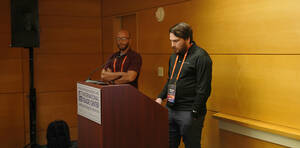Session Presentation
Automating FedRAMP CI/CD


June 25, 2025

Reinventing the Wheel
Architecting CI/CD for FedRAMP can feel like reinventing the wheel.

Session Overview
- Common Mistakes
- Major Challenges
- Automation Framework
Download Full Presentation (PDF)
Common Mistakes & Misconceptions
- What’s at Stake?
- Automating FedRAMP CI/CD
- 4 Challenges to FedRAMP CI/CD Automation
- FedRAMP CI/CD Framework
Major Challenges
CSP Specific Challenges
- Parity: Alignment of commercial staff, processes & tools to FedRAMP
- Speed: Time to market
- Codebase: Forking of Infrastructure as Code (IaC) and application code to support disparate environments
- Continuous Deployment vs Continuous Delivery
Challenge 1 – Government Clouds: Assumption vs. Reality
Government Clouds: Reality
- AWS GovCloud is a physically isolated partition
- ARNs, VPCs & IAM cannot cross boundaries
- Plan for code changes and re-architecting efforts
- Hardcoded configuration
- Service availability
- Feature limitations
Challenge 2 – Access Controls
Gray Areas
- Who can view it? FedRAMP users are subject to guardrails
- How is it accessed? Systems containing sensitive metadata must reside within the FedRAMP boundary
Sensitive metadata includes:
- Configuration data (hostnames, IPs, patching level, etc.)
- Scan data & security documentation
- Incident response data & tickets with specific system details
Challenge 3 – Change Management
This involves friction in:
- Developer Experience
- Release Velocity
Challenge 4 – Limited Tooling
- FedRAMP Authorized or Self-Hosted
- FIPS-Validated Cryptographic Modules
- Functionality: Small Subset of Industry Best-In-Class Tools
Recently Authorized CSOs
- 03/14/2025 – Atlassian Government Cloud
- 05/15/2025 – GitLab Dedicated for Government
- Reduced overhead and management of self-hosted tooling
Automation Framework
Foundational Pillars: Shifting Compliance Left
Compliant IaC
- Utilize centralized module repository with ”building block” reusability in mind
- Bake security best practices and compliance requirements into modules
- Integrate vulnerability and compliance scans into pipelines
- Re-audit usage and feedback cycle
Compliant Applications
- Utilize feature flags to control FedRAMP app features
- Integrate vulnerability and compliance scans into pipelines
- Automate FedRAMP artifact creation
FedRAMP as a Consumer
- Reduced Access Control: Developers are trained and thinking about FedRAMP requirements without direct access to boundary.
- Automated Artifacts: FedRAMP compliant container images and scan artifacts are generated prior to delivery and CCB.
- In-boundary Initiated Pull: Reduced risk of ”grey area” with regards to code and reduced codebase sprawl
- Expedited Deployments: Known deployment-ready (vulnerability scanned) images and artifacts.
- Optimize CCB Timelines: Automated artifacts significantly reduce CCB overhead and approval cycles.
- Smaller SRE Team: FedRAMP SRE team drives deployment forward once change approved.
Conclusion: Automating FedRAMP CI/CD
- CI/CD is achievable in FedRAMP with minor adjustment to staff, processes & tooling
- Commercial application code SDLC can remain untouched allowing for development outside of boundary
- Move with similar velocity as commercial while achieving FedRAMP compliance
Breakdown of CI/CD in FedRAMP:
- Build: Shift compliance left into commercial SDLC. Remediate vulnerabilities outside of boundary.
- Deploy: Automated deployment allows for small FedRAMP SRE team. Portable code allows development to occur outside of boundary.
- Release: Automate compliance artifact creation. Continue to iterate on friction points.
PCI Community Meeting 2025
Join us at the PCI Community Meeting September 16-18, where Coalfire will be showcasing our latest advancements in cybersecurity and compliance.
Learn more